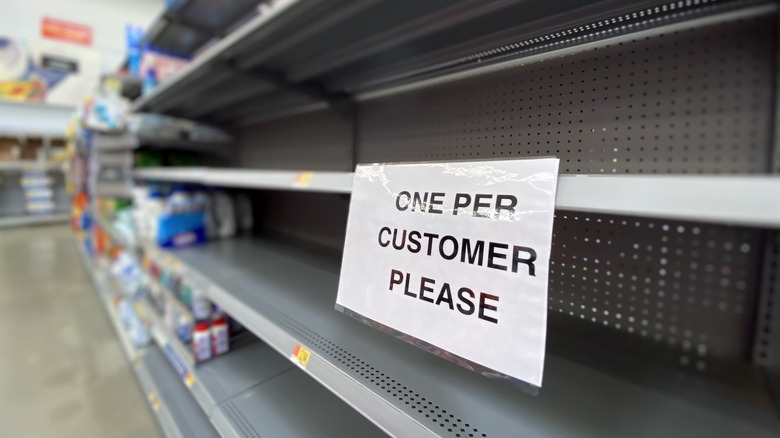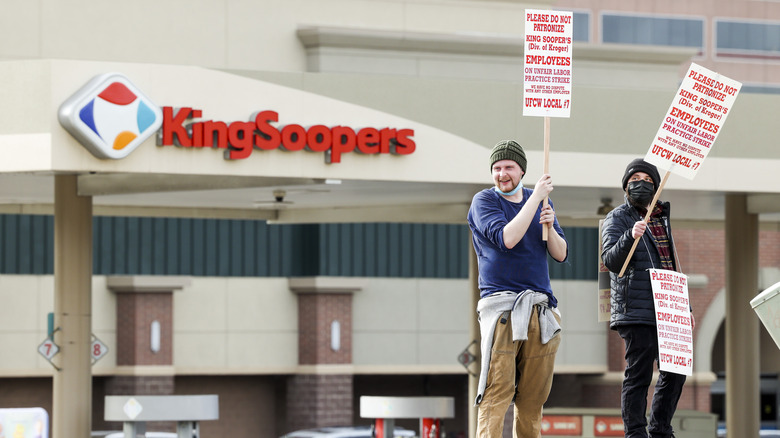The Real Reason You Should Expect Grocery Shortages In 2022
In 2021, shortages of certain products were still a novelty. Now, even though we've bought new calendars, the conditions of the world refuse to recognize that anything has changed. On Jan. 14, Reuters reported that grocery store shortages were continuing to worsen across the United States with the emergence of Omicron.
There isn't a new reason for these issues — the COVID-19 pandemic is raging, and workers want better compensation after initially dealing with the ordeals of the pandemic. As Civil Eats reported all the way back in April 2020, the strain placed upon the national supply chain due to the number of infected workers was already causing the issues. "Supply chains are so efficient, they call them 'just-in-time' food delivery systems," Robin Currey, the director of sustainable food systems at Prescott College, explained to the publication. In other words, hiccups morph into ripples that disrupt the whole system over time.
We're still in a pandemic
The most obvious proponent of the supply shortage is the Omicron variant, which has pushed the United States to a new record of daily cases. In a report by the Los Angeles Times, the variant created even more difficulty for supply chain operators. Both stores and food production companies saw increasing infection rates reduce their output. Meat processing plants, for example, are also now beginning to see a drop in productivity. This is despite the fact that they have yet to experience the surge of cases that defined them in the earlier stages of the pandemic.
The supermarket chain, Stew Leonard's, revealed to CBS News that in early January, 8% of its staff was either sick or forced to quarantine in case they were sick. Stew Leonard Jr., chief executive of Stew Leonard's, detailed what that number means in terms of the store's functions. "I talked with my bakery director, and she said, 'I make a great crumb cake, and I also make a great apple crumb cake, but when I'm short on people I'm not able to make the apple crumb cake,'" he told CBS News. Even with 92% of total staff working, a slight drop can eliminate an entire product.
Brands need to acquire workers
The pandemic has highlighted how essential workers are indeed very essential. At the same time, labor relations have grown more fraught due to workers realizing the power in their hands.
For example, workers at the Kroger-owned chain, King Soopers, went on strike amidst the crunch of the Omicron variant. "The companies were thriving, but our workers didn't thrive," Kim Cordova, president of a local branch of the United Food and Commercial Workers International Union, said in a press conference (via HuffPost). "Know what our workers got? COVID. Attacked. Beat up. Spit on. Slapped. Overworked."
Simultaneously, many of those who have not gone on strike have simply decided to quit. Some figure they deserve better than what they experienced during the pandemic. They not only had to deal with the increased risk of infection due to their frontline work, but they also suffered the ire of customers enraged by shortages and various health mandates. As one might imagine, fewer workers means that stores are less equipped to maintain their supply stock (via NPR).
Unlike Omicron, however, the new consciousness of supply chain workers can be directly addressed by companies. Grocery Dive relays a suggestion given by Chris Tilly, a professor at the Luskin School of Public Affairs: offer concrete benefits and opportunities to your workers. Some day, the current stresses of the pandemic will ease, but the memories will remain.


